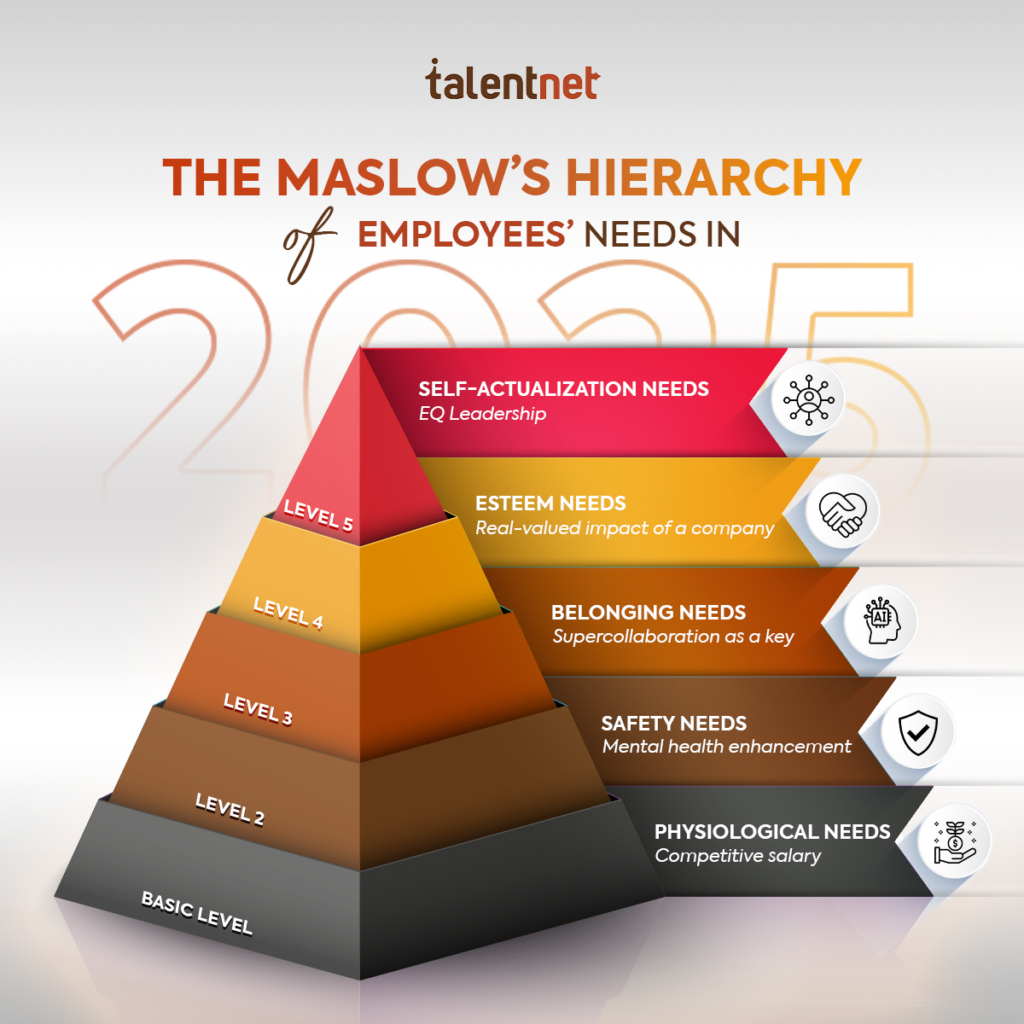Businesses Urged to Align With Maslow's Hierarchy of Needs

January 13, 2025
In anticipation of the evolving workforce in 2025, businesses are urged to revamp their HR strategy in line with Maslow's Hierarchy of Needs to improve employee satisfaction.

Compensation and benefits have always been key factors in employee satisfaction. However, as workforce needs evolve, these elements will undergo significant shifts.
Guided by Maslow’s Hierarchy of Needs, businesses will need to rethink their approach to meet basic material needs and address psychological safety, personal development, and recognition, ensuring a more holistic and motivating work environment.

Level 1: Physiological needs – Competitive salary
“Salary and compensation should directly reflect on performance, meaning pay should reflect results rather than just the number of hours worked,” said Minh Man, a 29-year-old office worker.
Historically, salary and benefits were regarded as the most decisive factors in employees’ job choices. However, in the modern workplace, the appeal of compensation extends beyond mere numbers. It now relies on fairness and transparency in performance evaluation. A well-defined performance assessment system empowers employees with clear expectations, guiding them on how to achieve bonuses or salary increments, thereby fostering motivation and driving higher performance.
Nguyen Thi Quynh Phuong, Head of Human Capital Solutions at Talentnet said that pay transparency will be a winning factor in every organization’s pay strategy in 2025. Incentive-based rewards, such as KPI bonuses, project success bonuses, and promotion opportunities tied to achievements, are effective ways to motivate employees to reach their full potential, hence, help companies to retain their best talent.
Level 2: Safety needs – Mental health enhancement
Mental health benefits are becoming a critical focus for businesses aiming to enhance employee satisfaction and retention. Modern employee benefit programmes are no longer limited to basic health insurance but are now personalised to meet the diverse needs of both employees and their families.
59% of employers recognise family-oriented benefits as a key factor in attracting and retaining top talent. One example is the extension of health insurance coverage to include employees’ spouses and children, rather than restricting it to the employee alone.
By shifting the focus to the wellbeing of employees’ families, businesses foster a deeper sense of stability and emotional support. This is especially crucial in an era of heightened workplace pressures, where mental health directly impacts employee performance and organisational engagement. Companies that prioritise holistic well-being not only boost employee morale but also strengthen long-term loyalty and productivity within the workforce.
Level 3: Belonging needs – SuperCollaboration is key

Beyond improving communication and team collaboration, AI plays a significant role in boosting employee performance. A Harvard study found that employees using AI tools can increase their work quality by up to 40 per cent compared to those without AI support. By leveraging AI for routine tasks, employees can focus on more high-impact work, meeting the demands of their roles with greater ease and securing their relevance in an evolving job market.
At the same time, the collaboration between humans and technology, particularly AI, has become a critical issue that businesses must address. Companies can no longer simply view AI as a tool to assist employees; they must embrace the concept of SuperCollaboration (a concept innovated by James Taylor, a keynote speaker at The Makeover 2024) – a close partnership between humans and technology. This means that in the future, AI will not only support tasks but also participate in decision-making, creativity, and process improvement. Businesses must create environments where both humans and AI can develop together, supporting each other, instead of viewing AI solely as a tool.
Level 4: Esteem needs – Real-valued impact of a company
Employees today are no longer just looking for a paycheck; they aspire to contribute to something meaningful. By implementing ESG principles—such as investing in green technology and developing carbon reduction strategies – companies create sustainable value and empower employees to feel proud of their contributions, knowing that their work drives tangible and positive change. With ESG-related assets projected to reach $53 trillion by 2025, ESG is not only an inevitable trend in global decisions but also strengthens the alignment between corporate missions and employees’ personal aspirations.
To effectively engage employees, organisations must integrate ESG into the entire employee lifecycle – from recruitment and training to career development and recognition. Programmes focused on green skill development, internal ESG initiatives, and structured career paths in ESG enhance employee loyalty and inspire greater commitment.
“When employees see their efforts aligned with a greater purpose, they develop a stronger sense of self-esteem, increased productivity, and deeper loyalty towards long-term sustainability goals. By prioritising ESG, companies can create a workplace where employees feel valued, inspired, and motivated to make a meaningful difference,” Quynh Phuong said.
Level 5: Self-actualisation needs – EQ leadership
One of the most effective ways to foster respect within an organisation is through leadership that demonstrates emotional intelligence (EQ). EQ leadership goes beyond recognising and managing one’s own emotions – it involves understanding and connection with others on an emotional level. Leaders with high EQ know how to listen, show empathy, and build trust within their teams, ensuring that every employee feels respected and valued.

“Leadership is not just about strategy; it’s about connection. At Talentnet, we believe that EQ is the foundation for extraordinary leadership, which is why we offer EQ courses that inspire growth, build trust, and unlock the power of compassionate leadership,” Phuong said.
These five aforementioned HR needs are expected to continue shaping the labour market in 2025, driving significant changes. However, depending on each company’s strategic goals and priorities, HR departments should tailor their plans accordingly. It may also be beneficial to consult professional HR advisory services to ensure they are not simply following trends but instead aligning strategies with the company’s actual needs.
Elevate your HR strategy with Talentnet. As your strategic HR partner, we offer comprehensive solutions to optimize your workforce, boost productivity, and drive business growth. Discover how Talentnet can transform your HR function. Visit HERE to learn more.
Source: VIR




